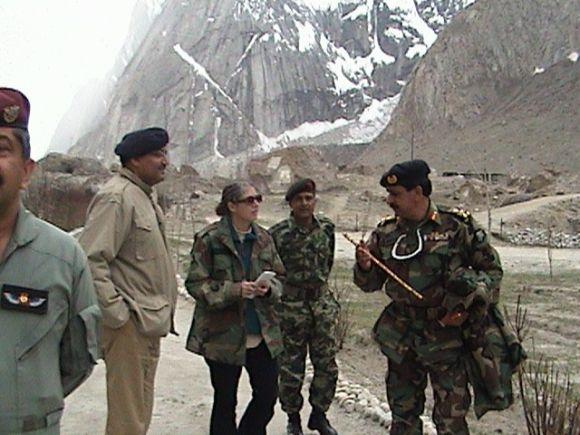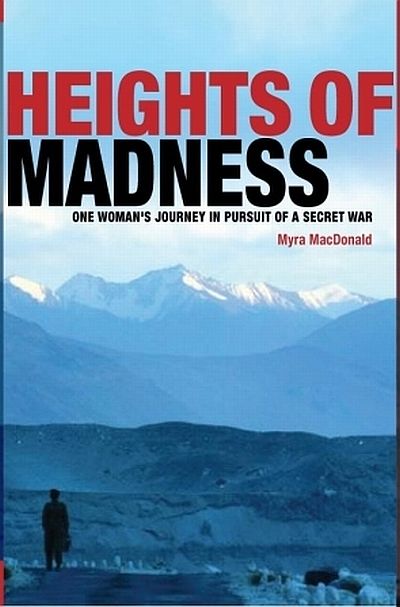
Myra MacDonald is a London-based journalist with Reuters and a long-time observer of South Asia.
She tracks the turning points in Pakistan politics at the Reuters Pakistan blog
MacDonald is best known for her book on the Siachen conflict, Heights of Madness: One Woman's Journey in Pursuit of a Secret War. Published in 2007, the research for the book took her to both sides of the conflict, on helicopter and on ground.
She was bureau chief of Reuters in India between 2000 and 2003.
She then took leave of absence to research the Siachen conflict, becoming one of the very few people to visit the war zone on both the Indian and Pakistani sides. She has given presentations on Siachen to the Royal Military Academy, Sandhurst and to the International Institute for Strategic Studies in London.
Amidst alarmist rumours that track-two parleys between India and Pakistan are urging India to 'give up Siachen', MacDonald tells Shivam Vij in an e-mail interview why resolving Siachen without resolving the Jammu and Kashmir dispute may not be easy.
The idea of demilitarising Siachen is being seen by some in India as a demand to hand Siachen over to Pakistan, or at the very least, to 'lose' the territory for which Indian soldiers have made great sacrifices.
Do you agree with such an interpretation of demilitarising the glacier? Do you think India has real strategic advantage with its occupation of the glacier?
The first thing to understand is that the conflict has not been fought over the glacier itself, but for control of the passes on the Saltoro ridge which overlooks Siachen and separates it from Baltistan.
Pakistan has no troops on the glacier itself, and India controls most of the higher positions. There is no strategic advantage in controlling these passes and never has been -- the idea sometimes floated that the Pakistan army could use these to link up with China and threaten India makes no sense when you see how difficult the terrain is.
That said, it is understandable that the Indian Army, having fought so hard for control of the higher positions in the region, would not want to give these up without some kind of guarantee from Pakistan that it would not occupy posts which India had vacated.
Please ...

Siachen was an un-militarised, un-inihabited glacier until 1984.
In both Indian and Pakistani narratives it is the other side that is responsible for the April 1984 skirmish that began the Siachen conflict.
While the Pakistanis say India was the aggressor, Indians says it had to occupy Siachen because Pakistan was conducting mountaineering expeditions there.
What is the truth? Can the responsibility of having started the Siachen conflict be fixed on one side?
Both sides bear some responsibility for the events that led to the outbreak of war in Siachen in April 1984, but on balance India has a greater share of the blame for setting those events in motion.
The origins of the conflict go back to before 1978, when Pakistan authorised foreign mountaineering expeditions to the Siachen glacier.
This was not unreasonable -- access to the glacier historically was far easier from the Baltistan side, across the Bilafond-la, the main pass through the Saltoro.
At some point, foreign maps began wrongly to mark Siachen as Pakistani territory, and this was used as an excuse by India to send a military mountaineering expedition to explore the glacier.
As India continued to send military mountaineering expeditions each summer to the glacier, Pakistan in turn became alarmed, sending its own men to investigate, and in the atmosphere of distrust in South Asia, mountaineering expeditions morphed into military patrols.
Reading the protest notes sent at the time, it is clear that Pakistan genuinely believed India was intruding on its territory -- it is also clear that with dialogue, the problem could have been resolved.
Instead, India decided to send troops in the summer of 1984 to occupy the passes; Pakistan, worried about Indian intentions, prepared its own plan to move in; and India -- by bringing forward its operation to April managed to get there first.
135 Pakistani soldiers and civilian staff died in an avalanche in the Gyari sector near Siachen earlier this year, but heavy costs in terms of life and limb have also been paid by the Indian Army in Siachen.
Why then do you think the Pakistanis rather than the Indians are keener for a quick resolution to Siachen?
Before the avalanche at Gyari, there was no practical reason for Pakistan being keener than India for a quick resolution to Siachen.
Since India occupies the higher positions, it has longer supply routes and is more dependent on helicopters for supplies -- it is therefore costlier for India to keep the war going and tougher on its troops.
The reasons for Pakistan wanting the conflict solved are political -- or even emotional -- rather than practical.
Pakistan has always seen the Indian occupation of Siachen in 1984 as an act of aggression in breach of the Simla agreement which states that no attempt should be made to change the Line of Control by force.
The LoC had been demarcated only as far as map grid reference point NJ9842, from where it was to continue 'thence north to the glaciers.'
Pakistan believes the LoC should continue to join up with the Karakoram Pass, giving it control of most of Siachen; India says it should follow the natural watershed -- the Saltoro ridge, giving it control of the glacier.
While it is possible to argue both claims, it is certainly fair to say that by occupying the passes, India did try to change the direction of the LoC by force -- thus making it the guilty party in breaching the Simla accords.
This is important in the context of the mindset of the Pakistan army, which is keen to assert that it is not wrong in seeing India as a threat.
The fact that India moved into Siachen first is also frequently cited by Pakistanis as justification for its subsequent military operation across the Line of Control in Kargil in 1999 -- for which they were internationally, and they say, unfairly, criticised.
Please ...

The Indian Army insists that demilitarising Siachen must be preceded by recording existing troop positions, but the Pakistani point of view is that that would amount to legitimising Indian control of a disputed territory.
For a short-term demilitarisation without prejudice to the eventual settlement of the Jammu and Kashmir dispute, do you think the Indian position is a reasonable one?
India has shifted over the years towards a maximalist position of insisting Pakistan recognise its control over Siachen and the passes before any withdrawal.
Recently, I have seen some articles extending this further -- arguing that since India claims all of the former kingdom of Jammu and Kashmir, including Baltistan, it had every right to occupy Siachen.
Were Pakistan to accept this, it would be, in its eyes, acknowledging India's right to change the Line of Control by force and exonerating it from an act of aggression.
For comparison, it is worth looking at draft agreements floated as far back as 1989, under which both sides would agree a withdrawal and the Indian positions marked only in an annex to the main accord -- a diplomatic finesse which would allow both countries to claim victory.
The Indian position is understandable in as much as it does not want to give up hard-won gains; but is not geared towards finding a compromise that would allow Pakistan to withdraw with a modicum of dignity.
Please ...

Although a ceasefire was declared in Siachen only in 2003, New Delhi and Islamabad came close to an agreement in 1992 to make Siachen a 'zone of disengagement.'
But India, and two years later Pakistan, went back from the proposed solution.
India hardened its position on Siachen in 1998 and especially after the Kargil war of 1999.
Do you think the 1992 draft can still guide a settlement?
The Kargil incursion by Pakistan sought to cut off Siachen from India and thus hardened the Indian Army's stance over Siachen.
In consequence, would any solution of the Siachen conflict be beholden to the larger J&K dispute?
After Kargil, it seems impossible to agree a withdrawal without a framework agreement on the larger J&K dispute.
There are practical reasons for this -- over the years the Siachen battlefield has sprawled outwards, so much so that posts eventually linked up with those in the Kargil sector of the Line of Control.
Any agreement to demilitarise Siachen would now require a similar willingness to demilitarise the LoC.
The 2008 attack on Mumbai has also further reduced Indian readiness to make any territorial concessions.
However, some small steps could be taken as a show of goodwill. The most obvious would be for India and Pakistan to run joint scientific expeditions in Siachen to establish how much the environment has been damaged by the war and by climate change.
The Gyari disaster should be a warning to both sides that their troops are more vulnerable to an unpredictable increase in avalanches.
Joint expeditions would at least get India and Pakistan working together and, perhaps more importantly, provide an important signal that both countries still consider the Siachen region as 'disputed.'
Otherwise, we are in danger of slipping in Siachen into the same deadlock that prevails over J&K as a whole, which Pakistan says is disputed territory and India says is not disputed.